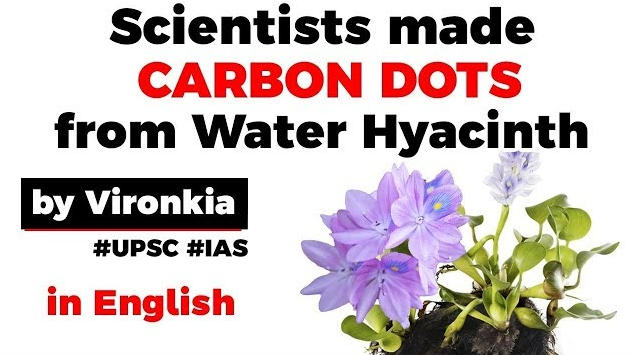Table of Contents
- In an extraordinary waste-to-wealth feat, researchers from Assam have used the commonly found invasive plant water hyacinth to produce carbon nanoparticles.
Water hyacinth

- The researchers harvested water hyacinth leaves, removed the chlorophyll, dried and powdered it.
- The sieved powder underwent several treatments including heating at 150 degree Celsius to convert it to carbon dots.
- When a nanoparticle is less than 10 nanometres call it a dot or nanodot.
- These carbon dots were able to give a green fluorescence under UV light.
- These extremely tiny (less than 10 nanometres) particles can be used for detecting a commonly used herbicide — pretilachlor.
- The nanoparticles were found to be selective and sensitive for the detection of the herbicide.
- Some teams are exploring if its fibre can be used to make furniture.
Carbon quantum dots

- Carbon quantum dots (CQDs, C-dots or CDs) are small carbon nanoparticles (less than 10 nm in size) with some form of surface passivation.
Applications
- Bioimaging
- Sensing
- Drug delivery
- Catalysis
- Fingerprint recovery
Herbicides & Insecticides Poisoning
- Herbicides and insecticides are chemical or biological agents used to kill unwanted pests that may diminish crops or otherwise affect human life. They are known for their beneficial effects, as well as for the hazards they may pose to the environment.
- Insecticides
- include organochlorines, organophosphates, and carbamates
Latest Burning Issues | Free PDF






















 WhatsApp
WhatsApp